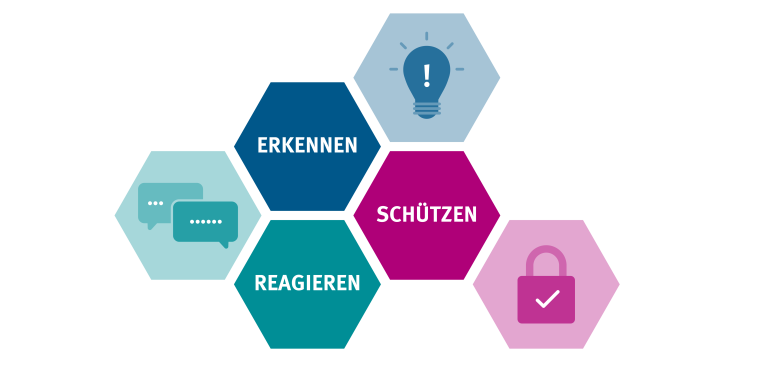

Informationssicherheit ERKENNEN, SCHÜTZEN, REAGIEREN
Informationssicherheit ist eine Gemeinschaftsaufgabe aller Mitarbeitenden, Studierenden und Angehörigen der Universität Münster. Erkennen-Schützen-Reagieren stellt dabei einen Dreischritt aus Kompetenzen dar, der den Umgang mit Informationssicherheit in Ihrem Arbeitsalltag zugänglicher machen soll.
Im Bereich Erkennen erhalten Sie Informationen zu potenziellen Gefahren, Vorgehensweisen von Angreifenden und dem Wert Ihrer Informationen.
Der Bereich Schützen gibt Ihnen konkrete Handlunghinweise, Step-by-Step-Anleitungen und nützliche Tipps zur Umsetzung einer sicheren Arbeitsweise in Ihrem Arbeitsalltag an die Hand.
In dem Bereich Reagieren finden Sie Anhaltspunkte, wie Sie einen sicherheitskritischen Vorfall erkennen können, wie Sie sich in solch einem Fall verhalten und an wen Sie sich sofort wenden können.
Schulungen zur IT- und Informationssicherheit
Für Beschäftigte
Web-Seminar IT-Sicherheit am Arbeitsplatz
Für Studierende
Checklisten
Nutzen Sie unsere Checkliste IT-Sicherheit, um Schritt für Schritt die nötigen IT-Sicherheitsmaßnahmen an Ihrem Arbeitsplatz umzusetzen.
Nutzen Sie unsere Checkliste: Betrügerische E-Mails erkennen, um Phishing- und andere schädliche E-Mails zu erkennen und sich vor ihnen zu schützen.
Nutzen Sie außerdem unsere Notfallkarte, damit Sie, falls Sie nicht mehr auf das Internet zugreifen können, Ihre zuständigen Kontaktpersonen erreichen können.
Hinweis auf unzulässige E-Mail Apps
Eine Reihe von Apps und Programmen sind zum Abrufen von E-Mails aus den Uni-Postfächern (sowohl über Exchange wie auch IMAP oder POP) unzulässig.
Die Liste umfasst derzeit folgende Anwendungen:
- Outlook-App für Android und iOS
- Outlook für MacOS (bei Verwendung von IMAP mit CloudSync)
- Das "Neue Outlook" bzw. "Outlook (neu)" (die unter Windows 11 vorinstallierte Outlook-Version)
- Edison Mail
- Newton Mail
- Spark Mail
- BlueMail
- Xiaomi Mail/MiMail
- Canary Mail
- myMail
- Mail.ru
Zur vollständigen Meldung hier
Warnung vor aktuellen Phishing-E-Mails
Aktuell werden vermehrt Phishing-E-Mails an Angehörige der Universität Münster verschickt.
Es werden E-Mails mit wechselnden Absende-Adressen verschickt, teilweise auch vorgetäuschte Uni Münster eigene E-Mail-Adressen oder E-Mail-Adressen anderer Hochschulen. Häufig wird der IT-Support oder auch Vorgesetzte vorgetäuscht. Bisher wurden die folgenden Betreffe beobachtet:
- Achtung: IT-technischer Support
- Handlung erforderlich: E-Mail-Konto verifizieren
- Mandatory Action Required, 8 pending messages that need review
- Wichtige Kursänderung!
- Zeitkritisch
Warnung vor aktuellen Phishing-E-Mails
Aktuell werden vermehrt Phishing-E-Mails an Angehörige der Universität Münster verschickt.
Es werden E-Mails vom "IT-Servicedesk" bzw. "IT-Support" vorgetäuscht mit wechselnden Absende-Adressen, teilweise auch Uni Münster eigene E-Mail-Adressen. Bisher wurden die folgenden Betreffe beobachtet:
- AW: Help Desk
- RE: IT-Servicedesk-Support
- RE: Ticket #89585 IT-Servicedesk.

